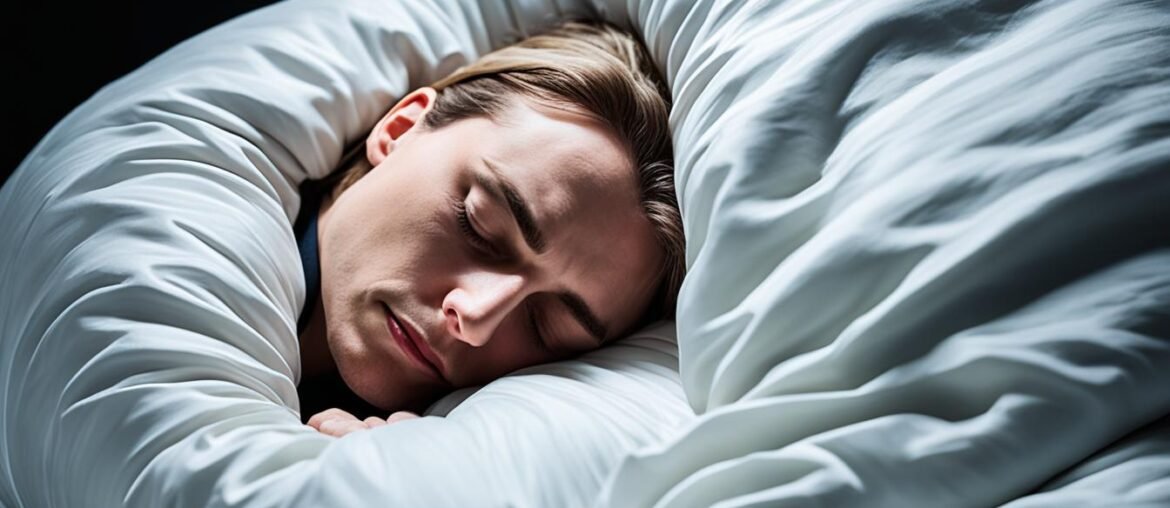Did you know that the quality of your sleep can directly impact the elasticity of your skin? It’s true! Getting enough high-quality sleep plays a crucial role in maintaining the health and youthful appearance of your skin.
Poor sleep quality and sleep deprivation have been found to have negative effects on skin elasticity. When you don’t get enough sleep, your skin can become dehydrated, texture can worsen, and wrinkles and fine lines may become more visible.
If you want to keep your skin looking its best, it’s important to prioritize good sleep habits. In this article, we’ll explore the relationship between sleep and skin health, the impact of sleep on skin hydration and collagen production, and tips for improving sleep to promote skin elasticity.
Key Takeaways:
- Poor sleep quality and sleep deprivation can negatively affect skin elasticity.
- Lack of sleep can lead to decreased skin hydration and worsened skin texture.
- Getting enough high-quality sleep is essential for maintaining healthy and youthful-looking skin.
- Sleep plays a role in collagen production and skin rejuvenation.
- Improving sleep quality and prioritizing a consistent sleep schedule can promote optimal skin health and elasticity.
The Relationship Between Sleep and Skin Health
Sleep deprivation can significantly impact skin health, leading to various negative effects. Studies have shown that individuals experiencing total sleep deprivation may experience increased pore size and skin darkening. Lack of sleep also influences vital skin characteristics, including hydration, texture, transparency, and elasticity. To maintain optimal skin health and promote skin elasticity, it is crucial to prioritize getting sufficient beauty sleep.
Sufficient sleep is essential for maintaining skin health and preventing undesirable skin conditions. Poor sleep quality and sleep deprivation can compromise the effectiveness of the skin’s natural functions, leading to adverse effects on skin elasticity. The body’s ability to repair and rejuvenate the skin is disrupted when sleep is inadequate.
By prioritizing quality sleep, individuals can support their skin’s natural processes and improve its overall health. Adequate sleep helps regulate the body’s hydration levels, enhance skin texture, and promote elasticity. It also aids in reducing the appearance of fine lines and wrinkles, contributing to a youthful and radiant complexion.
A balanced sleep schedule ensures that the body has enough time to repair and regenerate skin cells. During sleep, the body releases growth hormones that stimulate collagen production, a crucial protein that maintains skin elasticity. Adequate sleep also helps regulate cortisol levels, preventing excessive inflammation and skin damage.
To further emphasize the importance of beauty sleep, let’s take a closer look at how sleep deprivation affects specific aspects of skin health:
Effects of Sleep Deprivation on Skin Health
| Aspect of Skin Health | Effects of Sleep Deprivation |
|---|---|
| Hydration | Sleep deprivation disrupts the body’s hydration levels, leading to decreased moisture in the skin and potential dryness. |
| Texture | Lack of sleep can result in dull and rough skin texture due to impaired cell turnover and reduced collagen production. |
| Transparency | Sleep deprivation can cause the skin to appear dull and lackluster, affecting its transparency and natural radiance. |
| Elasticity | Inadequate sleep negatively influences skin elasticity, contributing to the formation of wrinkles and sagging skin. |
Understanding the impact of sleep deprivation on skin health highlights the importance of prioritizing quality sleep. Incorporating good sleep hygiene practices and establishing a relaxing bedtime routine can significantly improve sleep quality and promote optimal skin health and elasticity.
Getting sufficient beauty sleep is an essential step in any comprehensive skincare routine. Prioritizing sleep alongside good skincare habits helps individuals achieve and maintain healthy, radiant, and youthful-looking skin.
Skin Hydration and Sleep
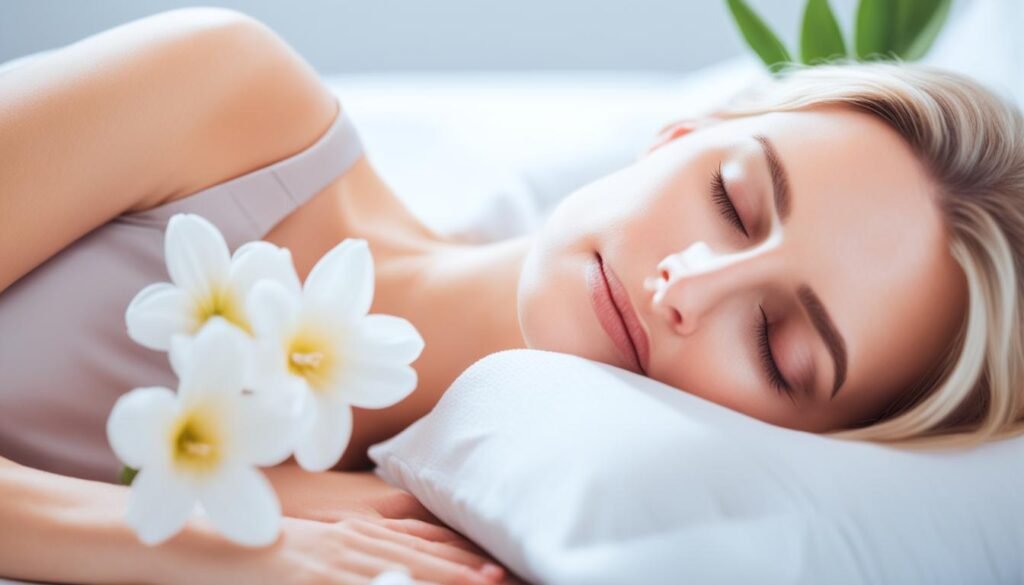
Adequate sleep is essential for maintaining optimal skin hydration. Research has shown that sleep restriction can lead to a gradual decrease in skin hydration. After just one day of sleep deprivation, skin hydration levels begin to decrease significantly and continue to decrease with prolonged sleep restriction. It is important to prioritize quality sleep to ensure proper skin hydration.
The Effects of Sleep Restriction on Skin Hydration
Sleep plays a vital role in promoting skin health, including maintaining adequate hydration levels. When we sleep, our bodies undergo various restorative processes, one of which is replenishing moisture in the skin. During sleep, our skin’s water content is replenished, helping to maintain its elasticity and overall health.
However, when we don’t get enough sleep or experience sleep deprivation, our skin’s hydration levels are affected. Studies have shown that sleep restriction can result in decreased skin hydration, leading to dryness and potential skin issues.
One study found that after just one night of sleep deprivation, skin hydration decreased by 10%. This decrease continued with consecutive nights of sleep restriction, reaching up to 30% after five nights of inadequate sleep.
Why Sleep is Crucial for Skin Hydration
Quality sleep allows our body to maintain a balanced level of hydration through various mechanisms. During sleep, our body’s production of the antidiuretic hormone (ADH) increases, reducing the amount of water lost through urine production, thereby conserving hydration levels.
Sleep also promotes optimal blood flow to the skin, allowing essential nutrients and water to reach the skin cells, nourishing and hydrating them. Additionally, sleep helps regulate the skin’s natural barrier function, preventing excessive water loss and maintaining optimal hydration levels.
Ensuring Proper Skin Hydration Through Quality Sleep
To support optimal skin hydration, it is important to prioritize quality sleep. Here are some tips to help improve sleep and promote skin hydration:
- Create a consistent sleep schedule and aim for 7-9 hours of sleep per night.
- Establish a relaxing bedtime routine to signal to your body that it’s time to sleep.
- Create a sleep-friendly environment by keeping your bedroom cool, dark, and quiet.
- Avoid the use of electronic devices before bed, as the blue light can interfere with sleep quality.
- Practice good sleep hygiene, such as avoiding caffeine and heavy meals close to bedtime.
- Use a gentle moisturizer before bed to help lock in moisture and hydrate the skin overnight.
By prioritizing quality sleep and taking steps to improve sleep habits, you can support optimal skin hydration and promote overall skin health.
| Effects of Sleep Restriction on Skin Hydration | Recommended Hours of Sleep for Optimal Skin Hydration |
|---|---|
| Decreased skin hydration | 7-9 hours per night |
| Dryness and potential skin issues | Create a consistent sleep schedule |
| 10% decrease in skin hydration after one night of sleep deprivation | Establish a relaxing bedtime routine |
| Up to 30% decrease in skin hydration after five nights of inadequate sleep | Create a sleep-friendly environment |
Collagen Production and Sleep
Collagen, the protein responsible for maintaining the elasticity and firmness of the skin, is greatly influenced by sleep. Research has shown that sleep plays a critical role in collagen production, ensuring the skin’s repair and rejuvenation processes are at their best. Specifically, collagen production increases during the final stage of sleep called REM (Rapid Eye Movement) sleep, while cortisol levels decrease.
During REM sleep, the body undergoes important physiological changes that contribute to skin health. This includes the reduction of stress hormones like cortisol, which can hinder collagen production. By keeping cortisol levels in check, the body promotes optimal collagen synthesis, enhancing the skin’s ability to repair and rejuvenate itself.
“The sleep cycle directly affects collagen production, which is crucial for maintaining youthful-looking skin and preventing signs of aging.”
Adequate sleep is essential to support optimal collagen production. Without sufficient sleep, the skin’s ability to produce collagen can be compromised, leading to reduced elasticity and the appearance of fine lines and wrinkles.
To ensure that collagen production is maximized, it is important to prioritize quality sleep. Creating a conducive sleep environment, implementing a relaxing bedtime routine, and establishing a consistent sleep schedule can all contribute to improving sleep quality and promoting optimal collagen synthesis.
By prioritizing sleep and allowing the body to go through the necessary sleep stages, individuals can support their skin’s natural repair processes and enjoy a more youthful and resilient complexion.
Sleep Patterns and Skin Aging
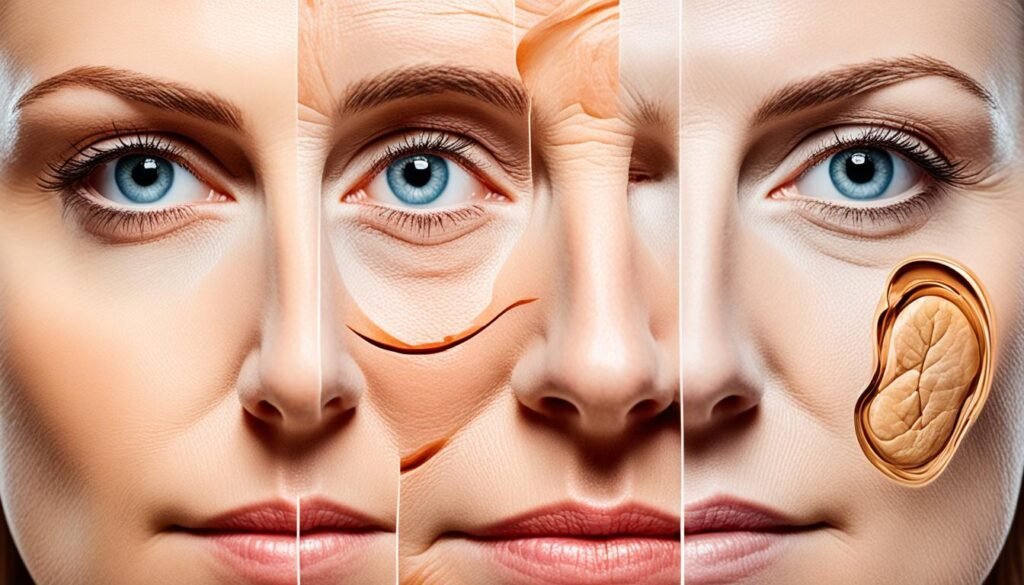
Sleep patterns can have a significant impact on the aging process of the skin. Chronic sleep deprivation and poor sleep quality can accelerate the signs of skin aging, leading to unwanted changes in skin texture and appearance. Lack of sleep can contribute to the development of increased wrinkles, crow’s feet, and frown lines, making the skin appear older and less vibrant. Additionally, inadequate sleep can result in a dull and uneven skin tone, further accentuating the signs of aging. Therefore, it is crucial to prioritize maintaining consistent and healthy sleep patterns to help slow down the skin aging process.
The Effects of Sleep Patterns on Skin Aging
Research studies have shown that individuals who consistently experience disrupted sleep patterns are more likely to exhibit premature signs of skin aging. Sleep disturbances, such as frequent awakenings throughout the night or irregular sleep schedules, disrupt the body’s natural repair and regeneration process. This interferes with the skin’s ability to restore itself, leading to a faster breakdown of collagen and elastin, the proteins responsible for maintaining skin elasticity. As a result, the skin becomes less firm and resilient, resulting in the development of visible lines, wrinkles, and sagging.
“Maintain a consistent sleep schedule and prioritize quality sleep can help slow down the skin aging process.”
| Sleep Patterns | Effects on Skin Aging |
|---|---|
| Chronic Sleep Deprivation | Accelerated development of wrinkles and fine lines |
| Poor Sleep Quality | Dull and uneven skin tone, increased signs of aging |
| Disrupted Sleep Patterns | Faster breakdown of collagen and elastin, increased sagging |
The table above highlights the detrimental effects of different sleep patterns on skin aging. Chronic sleep deprivation can lead to the accelerated development of wrinkles and fine lines. Poor sleep quality can result in a dull and uneven skin tone, intensifying the appearance of aging. Disrupted sleep patterns interfere with the natural rejuvenation process, causing a faster breakdown of collagen and elastin, ultimately leading to increased sagging of the skin.
By recognizing the importance of sleep patterns in skin aging, individuals can take proactive steps to improve their sleep habits and prioritize their overall well-being. Establishing a regular sleep schedule, practicing relaxation techniques before bedtime, and creating a comfortable sleep environment can contribute to better sleep quality and support the skin’s natural regenerative processes.
The Benefits of Sleep for Skin Appearance
Getting enough sleep is not only essential for overall health and well-being but also has numerous benefits for your skin appearance. Adequate sleep plays a crucial role in repairing and restoring the skin, leading to a healthier and more youthful complexion.
Sleep impacts various aspects of skin appearance, including hydration, wrinkles, fine lines, texture, and elasticity. Let’s explore how quality sleep can enhance the overall appearance of your skin.
Promotes Optimal Skin Hydration
Sleep is a vital time for the skin’s barrier function to restore and retain moisture. During sleep, the body repairs and replenishes itself, including the skin. Optimal hydration levels are crucial for a plump, supple, and radiant complexion.
By prioritizing quality sleep, you can support the skin’s natural moisture balance, preventing dryness and promoting a healthy glow.
Reduces the Appearance of Wrinkles and Fine Lines
Sleep deprivation and poor sleep quality can accelerate the development of wrinkles and fine lines. During sleep, the body produces collagen, a protein that helps maintain the skin’s structure and elasticity.
By getting enough sleep, you can ensure proper collagen production, which minimizes the appearance of wrinkles and fine lines, giving you a smoother and more youthful complexion.
Enhances Skin Texture and Elasticity
Quality sleep also contributes to improved skin texture and elasticity. During the sleep cycles, the body repairs damaged skin cells and increases blood flow to the skin, resulting in improved skin tone and texture.
Additionally, sleep helps regulate the levels of stress hormones, such as cortisol, which can affect the skin’s elasticity. By reducing stress and promoting restful sleep, you can enhance your skin’s overall firmness and elasticity.
Getting enough sleep is like giving your skin a daily dose of rejuvenation. It allows your skin to repair, restore, and regenerate, leading to a brighter, smoother, and more radiant appearance.
Quality sleep promotes optimal skin hydration, reduces the appearance of wrinkles and fine lines, and enhances skin texture and elasticity.
To further highlight the benefits of sleep for skin appearance, take a look at the following table:
| Sleep Benefits for Skin | Skin Appearance |
|---|---|
| Promotes optimal skin hydration | Healthy, glowing complexion |
| Reduces the appearance of wrinkles and fine lines | Smoother and more youthful-looking skin |
| Enhances skin texture and elasticity | Firmer and more resilient skin |
As shown in the table above, prioritizing quality sleep can have a significant impact on the appearance of your skin, resulting in a more vibrant and youthful complexion.
Investing in a good night’s sleep not only benefits your overall health but also contributes to achieving and maintaining a beautiful and radiant skin appearance.
Sleep Duration and Skin Rejuvenation
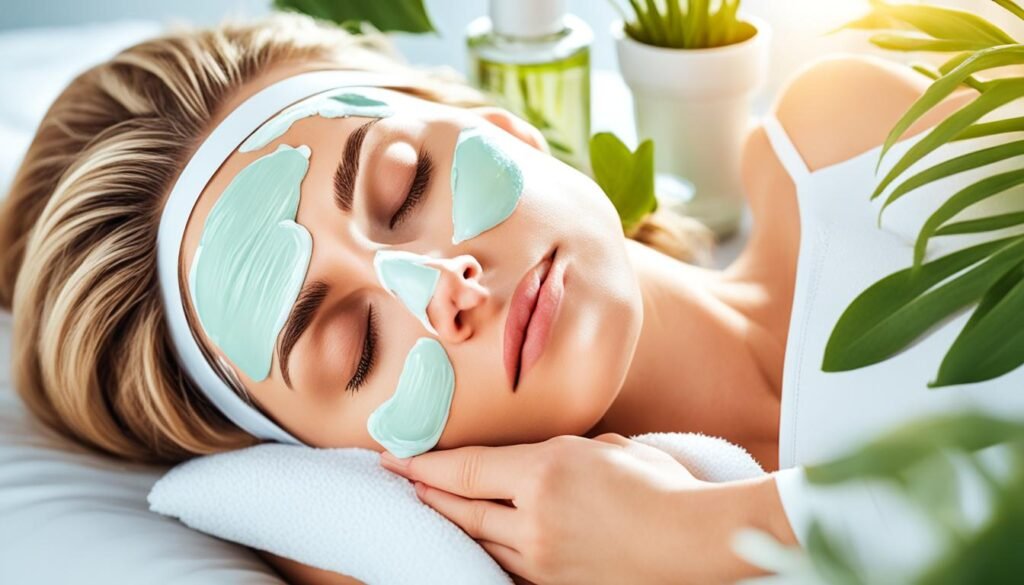
The duration of sleep plays a vital role in the process of skin rejuvenation. Research has shown that the first three hours of sleep are particularly important for the production of somatotropin, the human growth hormone responsible for maintaining youthful and healthy skin. Additionally, the later stages of sleep, particularly REM sleep, contribute to the reduction of cortisol levels and increased collagen production, leading to skin rejuvenation. Prioritizing an adequate duration of sleep is essential for optimal skin rejuvenation.
Getting enough sleep is not only important for feeling rested and energized, but it also plays a crucial role in the health and appearance of our skin. Sleep duration directly impacts the process of skin rejuvenation, which is essential for maintaining a youthful and healthy complexion.
“The first three hours of sleep are particularly crucial for the production of somatotropin, a hormone responsible for maintaining youthful skin.”
During the first three hours of sleep, our bodies go through a process of cell renewal and repair. This is when somatotropin, also known as human growth hormone, is produced in higher quantities. Somatotropin promotes collagen synthesis, boosts skin elasticity, and helps minimize the appearance of wrinkles and fine lines. By ensuring an adequate duration of sleep, we allow our bodies to produce this essential hormone, resulting in firmer and more rejuvenated skin.
Furthermore, the later stages of sleep, particularly REM (Rapid Eye Movement) sleep, contribute to skin rejuvenation. During REM sleep, cortisol levels naturally decrease, reducing inflammation and stress on the skin. At the same time, collagen production increases, promoting skin firmness and elasticity. Adequate sleep duration is necessary to experience the benefits of REM sleep and support optimal skin rejuvenation.
It is important to prioritize sleep duration and establish a consistent sleep schedule to give our bodies enough time for the rejuvenation process to occur. Aim for 7 to 9 hours of uninterrupted sleep each night to maximize the production of somatotropin and allow the skin to repair and regenerate itself.
In addition to sleep duration, other factors such as sleep quality and sleep environment play a role in skin rejuvenation. Creating a peaceful bedroom environment and practicing good sleep hygiene can further enhance the overall benefits of sleep for the skin.
Addressing Specific Skin Concerns Related to Sleep
Lack of sleep can have a significant impact on specific skin concerns, including dry skin, dullness, and dark circles under the eyes. Understanding how sleep deprivation affects these issues can help you address them effectively and achieve healthier, more vibrant skin.
The Impact of Sleep on Skin Hydration:
One of the direct consequences of inadequate sleep is a decrease in skin hydration. When you don’t get enough sleep, your body produces less hyaluronic acid, a molecule responsible for retaining moisture in the skin. As a result, your skin can become dry, flaky, and dull.
The Role of Cortisol in Dull Skin:
Inadequate sleep can disrupt the delicate balance of hormones in your body. Sleep deprivation often leads to elevated cortisol levels, which triggers inflammation and compromises the skin’s natural radiance. This inflammation can contribute to dullness and lackluster skin tone.
Dark Circles Under the Eyes and Poor Sleep:
Dark circles under the eyes are a common concern associated with lack of sleep. When you don’t get enough rest, blood vessels can dilate, leading to a pooling of blood in the delicate skin under the eyes. This, in turn, creates the appearance of dark circles.
To address these specific skin concerns related to sleep, it’s essential to focus on improving sleep quality and implementing a consistent skincare routine:
- Establish a bedtime routine that promotes relaxation, such as taking a warm bath or practicing mindfulness techniques.
- Create a comfortable sleep environment by keeping your bedroom dark, cool, and free of distractions.
- Avoid electronic devices before bed, as the blue light they emit can interfere with your sleep cycle.
- Follow a consistent skincare routine that includes gentle cleansing, moisturizing, and using products rich in antioxidants.
By addressing the specific skin concerns related to sleep and adopting healthy sleep habits, you can nurture your skin from within and achieve a more vibrant, refreshed complexion.
Tips for Improving Sleep and Promoting Skin Elasticity
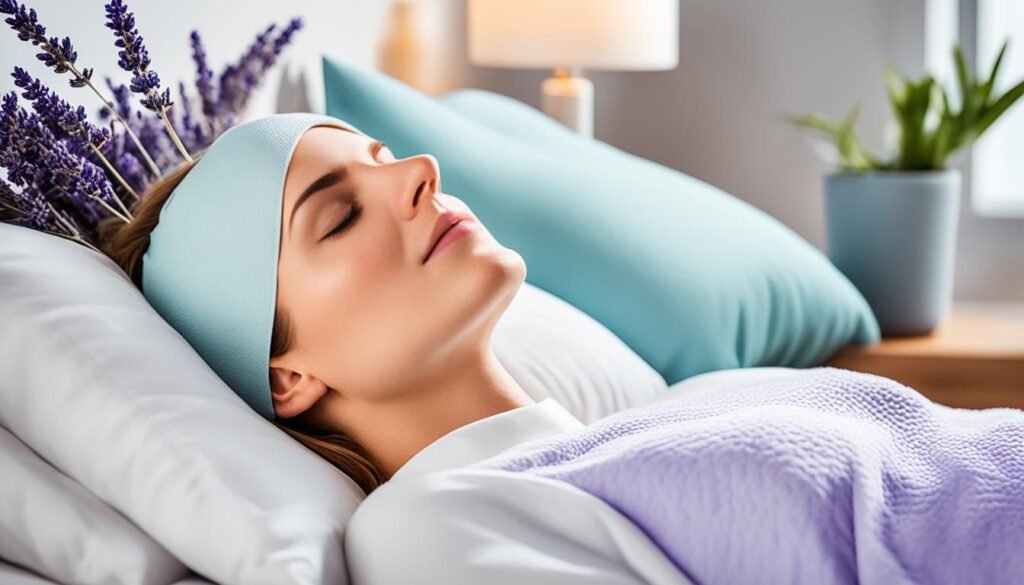
Incorporating good sleep hygiene practices can significantly improve sleep quality and promote skin elasticity. Here are some tips to help you optimize your sleep and maintain healthy, youthful-looking skin:
Establish a Regular Sleep Schedule
Try to go to bed and wake up at the same time every day, even on weekends. This helps regulate your body’s internal clock and promotes consistent, restful sleep.
Create a Relaxing Bedtime Routine
Develop a relaxing routine before bed to signal to your body that it’s time to unwind. Consider activities such as reading a book, taking a warm bath, or practicing relaxation techniques like deep breathing or meditation.
Maintain a Comfortable Sleep Environment
Make your bedroom a sleep-friendly environment. Keep the room cool, dark, and quiet, and invest in a supportive mattress and comfortable bedding to enhance your sleep quality.
Avoid Electronics Before Bed
Electronics emit blue light, which can interfere with your sleep-wake cycle. Avoid using electronics, such as smartphones, tablets, and computers, for at least an hour before bed to ensure better sleep.
Practice Good Skincare Habits
Take care of your skin before you sleep to promote skin elasticity. Cleanse your face thoroughly to remove impurities, apply a moisturizer to keep your skin hydrated, and consider using antioxidant-rich products that support collagen production.
By following these tips, you can improve your sleep quality and support the elasticity and overall health of your skin. Remember, a good night’s sleep is not only essential for your well-being but also for maintaining a glowing and youthful complexion.
Conclusion
Sleep is not only crucial for overall well-being but also plays a significant role in maintaining healthy and elastic skin. Adequate sleep has several benefits for skin health by promoting optimal hydration, collagen production, and skin rejuvenation. On the other hand, lack of sleep can lead to various skin concerns including dryness, dullness, and dark circles under the eyes.
By prioritizing good sleep habits and incorporating a consistent skincare routine, individuals can enhance the health and appearance of their skin. Quality sleep, often referred to as “beauty sleep,” is an essential part of a comprehensive skincare regimen. It helps to repair and restore the skin, resulting in a healthier, more youthful complexion.
It is important to remember that skincare is not limited to external factors like creams and serums; it also involves taking care of our body’s internal needs. Getting enough sleep is a fundamental component of this. By ensuring adequate sleep duration and quality, we can support the optimal functioning of our skin cells and promote skin elasticity. Prioritizing sleep benefits not only our overall well-being but also contributes to achieving healthy and radiant skin.
FAQ
How does sleep affect skin elasticity?
Sleep plays a crucial role in maintaining the health and elasticity of the skin. Lack of sleep can lead to decreased skin hydration, aggravation of skin texture, and increased appearance of wrinkles and fine lines.
What are the negative effects of sleep deprivation on skin health?
Sleep deprivation can result in increased pore size, darkening of the skin, reduced hydration, texture changes, and decreased elasticity. It can also accelerate the signs of skin aging, leading to the appearance of wrinkles, crow’s feet, and frown lines.
How does sleep impact skin hydration?
Adequate sleep is essential for maintaining optimal skin hydration. Sleep restriction can lead to a gradual decrease in skin hydration, which can cause dryness and dullness.
Does sleep affect collagen production?
Yes, sleep plays a role in collagen production. During the final stage of sleep, known as REM sleep, cortisol levels decrease, and collagen production increases. This process helps the skin repair and rejuvenate itself.
How do sleep patterns affect skin aging?
Chronic sleep deprivation and poor sleep quality can accelerate the signs of skin aging. Lack of sleep can lead to increased wrinkles, crow’s feet, frown lines, dullness, and uneven skin tone.
What are the benefits of sleep for skin appearance?
Adequate sleep helps repair and restore the skin, leading to a healthier and more youthful complexion. It promotes optimal skin hydration, reduces the appearance of wrinkles and fine lines, and enhances skin texture and elasticity. Getting enough sleep can result in a brighter, smoother, and more radiant skin appearance.
How does sleep duration impact skin rejuvenation?
The duration of sleep is crucial for skin rejuvenation. The first three hours of sleep, and particularly the later stages including REM sleep, contribute to the reduction of cortisol levels, increased collagen production, and optimal skin rejuvenation. Adequate sleep duration is necessary for this process.
What specific skin concerns can be caused by lack of sleep?
Lack of sleep can contribute to specific skin concerns such as dry skin, dull skin, and dark circles under the eyes. Sleep deprivation leads to lower hydration levels in the skin, resulting in dryness. Inadequate sleep can also increase cortisol levels, triggering inflammation and causing dullness. Blood vessel dilation from lack of sleep can contribute to the appearance of dark circles under the eyes.
How can I improve sleep and promote skin elasticity?
Incorporating good sleep hygiene practices can help improve sleep quality and promote skin elasticity. Establishing a regular sleep schedule, creating a relaxing bedtime routine, maintaining a comfortable sleep environment, and avoiding the use of electronics before bed can contribute to better sleep. Additionally, practicing good skincare habits such as cleansing the face before bed, moisturizing the skin, and using antioxidant-rich products can support skin elasticity.
What is the importance of sleep for skin health?
Sleep plays a significant role in maintaining healthy and elastic skin. Adequate sleep promotes optimal skin hydration, collagen production, and skin rejuvenation. It helps repair and restore the skin, leading to a healthier and more youthful complexion.

